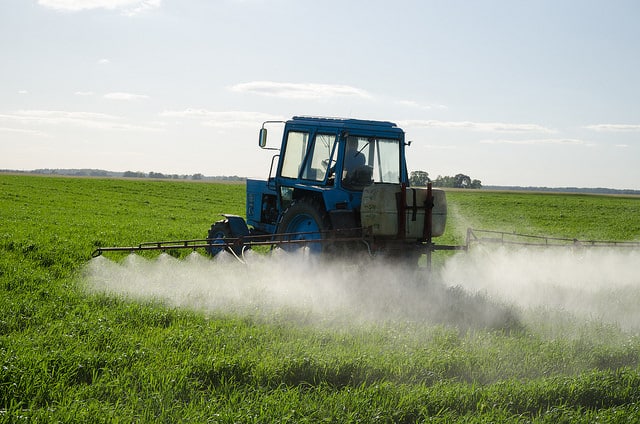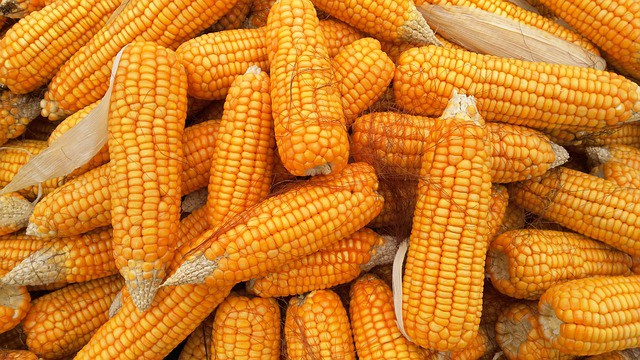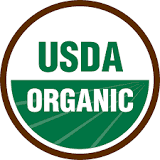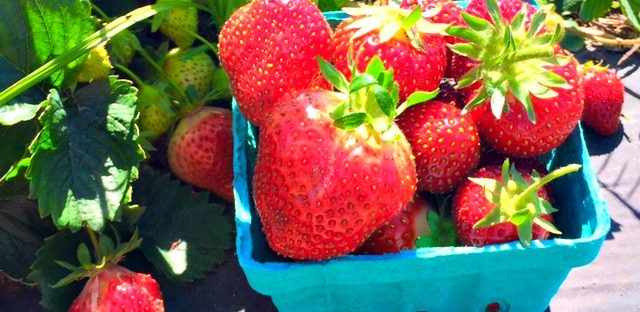We had a perfect day to go strawberry picking. There is a local organic strawberry farm not too far from home that was getting ready for their annual strawberry festival that weekend. We hit it on Friday before the crowds and before the fields got picked over. There is nothing like the taste of a ripe red strawberry, warm from the sun and red all the way through. They were so sweet and delicious, it begs the question: Is organic better?

Flavor
One thing I have noticed personally with organic fruits and vegetables is the taste. There is no denying that there is more flavor in organic fruits and vegetables. If you find can local produce from your farmer’s market, or even better, grow it yourself, the taste difference is even more pronounced. Why do organic foods taste better? There is a reason.
The mineral content in the soil gives the vegetable or fruit its flavor. Through industrial farming, the mineral content of the soil has been deteriorating throughout the years. As it deteriorates, there are fewer microorganisms in the ground. It is the microorganisms that transfer nutrients from the soil to the plant. So the healthier the soil, the better the flavor.
The American Association for the Advancement of Science concluded that agriculture chemicals used on conventional farms kill off the microorganisms, leaving the soil devoid of nutrients. This is why the flavor is gone from most conventional produce. It is also why our fruits and vegetables are less nutritious.
According to Dr. August Dunning, chief science offer or Eco-Organics, “in order to receive the same amount of iron you used to get from one apple in 1950, by 1998 you had to eat 26 apples!” Since organic farms have to rely on natural methods of deterring pests, the plants must be stronger and the soil must be healthier. Organic soil contains more microorganism than conventional soil, thus more nutrients, and more flavor!
Antioxidants and Phenols
Organic produce has also been found to contain higher amounts of antioxidants. The British Journal of Medicine published a study in 2014 that found organic foods contained 18-69 percent more antioxidants. Antioxidants are vital to good health and anti-aging.
Many studies have proven there is a higher phenol content in organic food. Phenol compounds in food play a vital role in cancer prevention. Phenols are associated with the nutritional content of the food.
Pesticide Exposure

photo from https://www.flickr.com/photos/aquamech-utah/24443679794
Over 100 million tons of herbicides have been sprayed on crops in the past ten years. Children are the most susceptible to the harmful effects of pesticides. The chemicals being sprayed on our foods have been found to be hormone disruptors, carcinogens, neurotoxins, and reproductive toxins. Glyphosate is one of the most common herbicides used today. This has been connected to birth defects and infertility. It is also responsible for destroying the soil.
Harvard University has found that pesticides are affecting brain health in children. They linked ADHD and lower IQ with pesticides found in the mother’s urine during pregnancy. The also found through MRI’s, altered brain structure in children whose mothers were exposed to pesticides. The average American diet exposes people to high amounts of pesticides through our food.
BT Corn

The most disturbing thing happening in our food culture is Bt Corn. Bt Corn is a genetically modified corn crop that contains a gene in it that causes a pest’s stomach to explode when the bug eats it. This corn is used by food manufacturers to create all sorts of corn products that you can find in virtually every food that comes in a box in the grocery store. It is also being fed to feedlot animals, and you may be consuming the meat from these animals.
At first, the EPA claimed this chemical was harmless to humans. However, in 2011 the Sherbrooke Hospital in Quebec found this claim to be false. The BT-toxin was found in 96% of pregnant women, 80% of umbilical blood in their babies, and 67% of non-pregnant women.
Another study found that the Bt toxin does indeed cause an immune system response in mammals. This is associated with infections and allergies, asthma, arthritis, food allergies, cancer, MS, and connective tissue disorders.
Here are names of foods containing this corn derivative to look out for: citric acid, confectioner’s sugar, corn flour, corn fructose, corn meal, corn oil, corn syrup, dextrin and dextrose, fructose, lactic acid, malt, mono- and diglycerides, monosodium glutamate, sorbitol, and starch. Many vitamins also contain this corn.
How to know if your food is organic?
The USDA does place strict rules for food to be labeled certified organic. This certification assures the farmers are not using chemical pesticides, sewage sludge, synthetics fertilizers, or genetically modified organisms. It also places strong restrictions on food companies processing and distributing organic food. Often your local farmer may be following organic methods, but may not have gone through the expense of government certifications. In this case, it is best just to ask the farmer. Certified organic food will be labeled with this seal:

is organic better?
So is organic better and worth the extra expense?

In my opinion, it is best to try to buy organic whenever you can, especially if you are pregnant and for your children. At least avoid conventional foods on the Dirty Dozen list which contain the highest amount of pesticides that cannot be washed off. Here is the list:
The Dirty Dozen
Strawberries
Spinach
Nectarines
Apples
Peaches
Pears
Cherries
Grapes
Celery
Tomatoes
Sweet bell peppers
Potatoes
Sources
Barański, M., D. Srednicka-Tober, N. Volakakis, C. Seal, R. Sanderson, G. B. Stewart, C. Benbrook, B. Biavati, E. Markellou, C. Giotis, J. Gromadzka-Ostrowska, E. Rembiałkowska, K. Skwarło-Sońta, R. Tahvonen, D. Janovská, U. Niggli, P. Nicot, and C. Leifert. “Higher Antioxidant and Lower Cadmium Concentrations and Lower Incidence of Pesticide Residues in Organically Grown Crops: A Systematic Literature Review and Meta-analyses.” The British Journal of Nutrition. U.S. National Library of Medicine, 14 Sept. 2014. Web. 17 June 2017.
Feldscher, Karen. “Health Benefits of Organic Food, Farming Outlined in New Report.”News. Harvard, 21 Feb. 2017. Web. 17 June 2017.
Latest posts by Erin Sands (see all)
- Meyer Lemon Tart – Gluten/Dairy Free - January 23, 2020
- Gingery Roasted Cranberry Sauce - November 9, 2019
- Blueberry Skillet Baked Oatmeal - June 18, 2019
